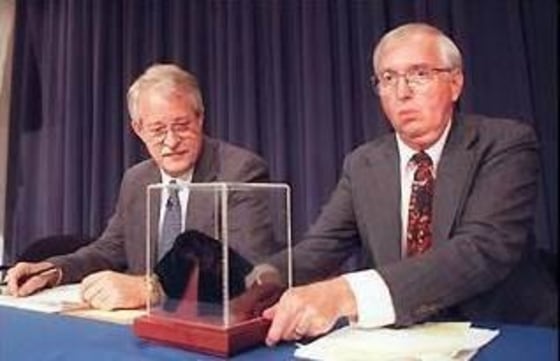By Nancy Atkinson
NASA scientist David S. McKay has passed away at the age of 77.
McKay may be best-known for research focusing on a meteorite from Mars, ALH84001, and his view that it contained evidence for life on Mars in the form of "nanofossils."
McKay, who had been battling serious cardiac health problems for some time, died peacefully in his sleep early on Wednesday, NASA's Johnson Space Center said.
McKay had been the chief scientist for astrobiology at NASA and searched for evidence of past life on Mars using Martian meteorites and terrestrial analogs. He performed original research on lunar soils, lunar pyroclastics and space weathering.
McKay joined NASA in June of 1965 and participated extensively in astronaut training until the Apollo 11 mission. He was named a principal investigator to study the first samples brought back from the moon, and continued as a lunar sample principal investigator for the next 20 years. He started many of the laboratories for the Lunar Sample Facility at Johnson Space Center and managed the NASA space resources program out of the center during much of the 1980s.
McKay published more than 200 peer-reviewed papers on lunar samples, space resource utilization, cosmic dust, meteorites, astrobiology and Mars topics, and NASA said his “body of work includes many contributions to our understanding of the development and evolution of the lunar regolith and space weathering processes.”
Most notably, he was the lead author on the 1996 paper in Science on the ALH84001 Martian meteorite that was found in Antarctica. McKay and his colleagues argued that the rock contained evidence for life on Mars.
"Although that claim was highly controversial, there can be no question that the appearance of that paper sparked significant changes in Martian and planetary science, shaped the direction of the Mars Exploration Program to the present day, and prompted the establishment of the NASA Astrobiology Institute," NASA said. “Whether one accepts their arguments or not, it has led, directly or indirectly, to investigations seeking and finding signs of life in the most extreme environments. History will judge the value of that rather serendipitous outcome, but it seems clear that its significance is, and will remain, great."
More about McKay and ALH 84001:
- Mars scientist discusses the big questions
- Meteorite research revives life-on-Mars debate
- Life on Mars, continued
This report was originally published on Universe Today as "Scientist Who Studied Famous Martian Meteorite Passes Away." Copyright 2013 Universe Today. Reprinted with permission.
